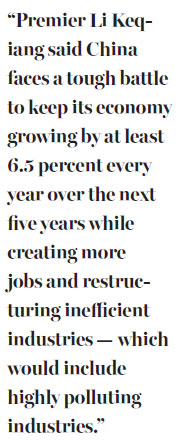Making head and tail of eco-problems
Updated: 2016-03-11 08:09
By Xin Laizhe(China Daily Europe)
|
|||||||||
Purple haze. For those who grew up in the 1960s and 1970s, the words bring back memories of the electrifying Jimi Hedrix and his more electrifying ways with the guitar. For many living in North China today, they may sound more like one of the stanzas in the song: Purple haze all in my eyes/Don't know if it's day or night/You got me blowin', blowin' my mind/Is it tomorrow, or just the end of time?
We are talking about smog. The smog that prompted the world media to pounce on China, blaming it for all that was wrong with emissions control.
When Beijing issued two red alerts for smog in succession in December, foreign media outlets made it out as it was the end of the world. Images of people in different types of masks were splashed across the foreign media, some even highlighting people wearing gas masks. Some Chinese media outlets too joined the fray, either enamored by their overseas counterparts or to genuinely portray the serious state of affairs.
Serious the condition was during those few days. There is no denying of it. Or else, the authorities wouldn't have ordered schools closed, construction halted, traffic restricted and production in seriously polluting industries suspended. But instead of appreciating the prompt action of the Chinese authorities, many media outlets focused on the inconvenience caused to the parents of school-going children and residents in general.

Ironically, had the authorities not imposed the emergency measures, the media would have decried its lackadaisical approach to the serious health hazard. A perfect situation of damned if you do, damned if you don't.
This is not to suggest China doesn't face a smog (and carbon emissions) problem, or for that matter environmental challenge. It does. And it admits it. We could differ with the way it intends to solve the problem or overcome the challenge. For example, the continued stress on urbanization could, to some extent, offset the gains of the environmental protection measures. We could even say the pace of implementing the eco-protection measures is not conducive to meeting the challenge.
But the history of environmental degradation is long. And contrary to popular belief, it did not start with reform and opening-up. Of course, the fast economic development of the past three decades or more aggravated it. That, however, is the price all countries have paid, continue to pay, and will pay in the future for economic development and prosperity. Moreover, it wouldn't be out of place to remind foreign critics eager to target China for all the wrong reasons that many of the country's polluting industries were producing goods (and still do) to satisfy the rest of the world's (especially the West's) consumption demand.
China is a country of more than 1.3 billion people. Its problems are different in nature and dimension than those of most other countries. It has to strike the right balance between environment protection and economic development, lest it leaves a large percentage of its population to the rigors of poverty and desperation.
This is exactly what the 13th Five-Year Plan (2016-20) aims to do. Presenting the Government Work Report on the opening day of the National People's Congress' annual session on March 5, Premier Li Keqiang said China faces a tough battle to keep its economy growing by at least 6.5 percent every year over the next five years while creating more jobs and restructuring inefficient industries - which would include highly polluting industries.
Among the challenges China faces are tricky financial markets, slowing global trade and environmental degradation. And to improve the environment, the five-year plan aims to restrict total energy consumption to 5 billion tons of standard coal by 2020 and make water consumption more efficient.
China knows its environmental problems. It knows how to solve them, too. Otherwise, it wouldn't have been the largest investor in green energy.
Many consider Purple haze to be a psychedelic experience. Hendrix said it was a love song. Perspectives matter.
They do, especially when it comes to analyzing China's environmental problems.
The author is a writer with China Daily.
Today's Top News
Inspectors to cover all of military
Britons embrace 'Super Thursday' elections
Campaign spreads Chinese cooking in the UK
Trump to aim all guns at Hillary Clinton
Labour set to take London after bitter campaign
Labour candidate favourite for London mayor
Fossil footprints bring dinosaurs to life
Buffett optimistic on China's economic transition
Hot Topics
Lunar probe , China growth forecasts, Emission rules get tougher, China seen through 'colored lens', International board,
Editor's Picks

|

|

|

|

|

|







